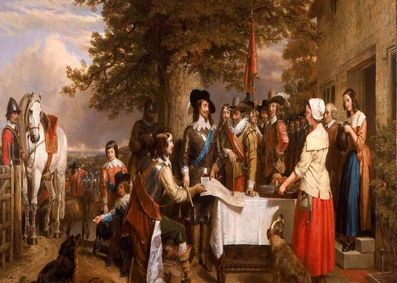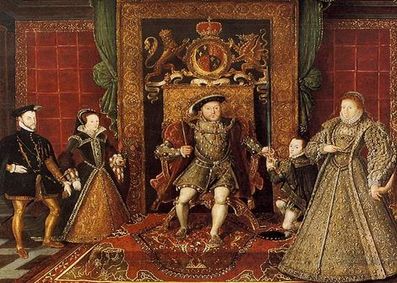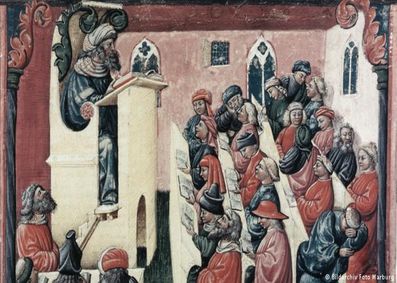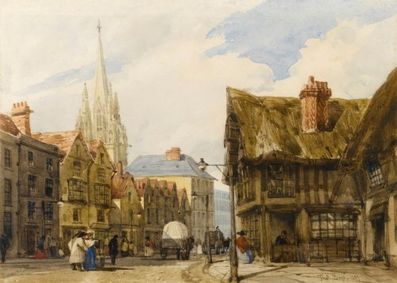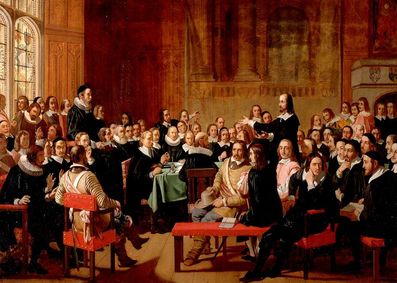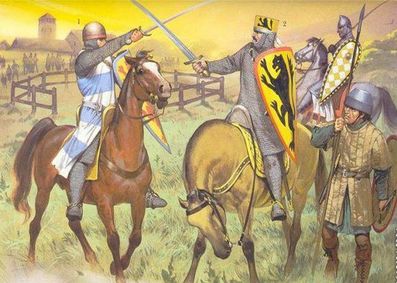- NOW began the Commotions in France to flame forth, whilest the private ambition of emulating Princes, during the minority of Charles the ninth, was masked on both sides under the glorious pretext of Religion, and the Professors of the Reformed Religion were most grievously afflicted. And whereas thereupon the Papists in England (in what vaine hope I know not) muttered many and great matters in secret talke amongst companies, of suppressing in like manner the Protestants in England, all places were full of suspition. Margaret Countesse of Lenox, niece to Henry the eighth by his eldest sister, was committed to Sir Richard Sackvill, and her husband the Earle of Lenox, who had secret entercourse of Letters with the Queene of Scots, to the custody of the Master of the Roles, and for a time detained. Arthur Poole and his brother, great grand children to George Duke of Clarence, brother to King Edward the fourth, Antony Fortescue who had married their sister, and others, were arraigned for that they had conspired to withdraw themselves into France to the Duke of Guise, and from thence to returne with an Army into Wales, and to proclaime the Queene of Scots Queene of England, and Arthur Poole Duke of Clarence. All which they ingenuously confessed at the Barre, protesting notwithstanding that they meant not to enterprize these things while Queene Elizabeth lived, who (they beleeved) would dye ere the yeere came about, being induced so to thinke by the unlawfull Arts of conjuring Wisards. Whereupon they were condemned to dye; nevertheless their lives were spared for reverence <of> the blood Royall. But the Lady Catharine Grey, daughter to Henry Grey, Duke of Suffolke, who was much neerer to the Queene in blood, was (as many thought) sharpely handled. For being grand-daughter to the other sister of King Henry the eight, and marryed to Henry eldest sonne of the Earle of Pembroke, and soone after lawfully divorced and long time neglected, when she was now with childe and ready to be delivered, was cast into the Towre of London, professing that shee was joyned in lawfull wedlocke with Edward Seimore Earle of Hertford, and by him gotten with childe. He being sent for home out of France, whither hee was gone for his pleasure with the Queenes good leave, openly professed the same, and was clapt up in the same Towre. The Archbishop of Canterbury and others were made Delegates to heare and determine the cause, without all appeale. And when he could not within a time prescribed produce witnesses of the marriage, a definitive Sentence were [sic] pronounced by the Archbishop, that he had undue and unlawfull carnall copulation with her, and that for such their excesse, both he and she to be punished. This Sentence, as unjust, unreasonable, and none at all, John Hales, a man most opiniative, but of much variety in learning, impugned, arguing that they were lawfull man and wife by their sole consent. Whereupon he also was committed to custody. She was shortly after brought to bed of her first begotten sonne in the Towre, and afterwards also bare another by Hertford, having corrupted their Keepers; which Edward Warner Lieutenant of the Towre rued, being therefore put by his place and committed to custody. And Hertford himselfe was accused in the Starre-chamber of a threefold crime: that he had deflowred a Vergin of the royall Blood in the Queens house, that he had broken prison, and that he had ravished her the second time. He protesting that hee had lawfully contracted marriage with her, denyed not but he had passed through the doores of the prison standing open, and had payed his marriage debt. Whereupoon he was for every crime fined at five thousand pounds, and kept in prison the space of nine yeers. Neverthelesse being perswaded by his Councell, he ceased not to interpose his appeale against the Archbishops Sentence and to continue it privily; which notwithstanding he hath in these days voluntarily and publickly renounced. She after certaine yeeres (that I may here for once joyne together matters of severall and sundry times) being taken with a grievous sicknesse, craved pardon of the Queene before Hopton, Lieutenant of the Towre, that she had contracted marriage without her privity, and with obtestations commending her children and Hertfords liberty to her protection, slept piously and peacably in Christ.
- The warre now growing both in France betweene the Princes of the blood and the Guises, both sides seeking (as I said) the cloake and colour of Religion as the foundation of their party, Queene Elizabeth began to feare lest England would also be involved in the fire of her neighbours warre. For she had heard that the Guises, to the end to allure Antony of Burbon King of Navarr to their party, had secretly offered unto him the Kingdome of Navarr, and the marriage of the Queene of Scots, together with the Kingdome of England in dowry, and that by the help of the King of Spaines wealth and the Bishop of Romes authority, who would dissolve the marriage of Navarr with his heriticall wife, and withall depose Queene Elizabeth from her Crowne for heresie. Hereupon shee sent thither Sir Henry Sidney, a man of most approved note, to learne these things more certainely, and perswade the heads of the parties to peace. But the matter was now growne to that passe, that they stopped their eares on both sides against peace. Sidney returning out of France was presently sent to the Queene of Scots, that the interview which shee had desired with Queene Elizabeth in England might be put off till the next yeere following, or till the French warre were pacified.
- Now was it consulted whether it would be behoovefull that these two Queenes should descend to an interview. Whereas the Queene of Scots was the first that desired it, it was not without suspicion that she did it to serve her turne and to temporize, that she might strengthen her Title to England, or else give hope and courage to the Papists in England and to the Guises her kinsmen in France. Contrariwise, others were of opinion that hereby a most firme amity might be built betwixt them, that the confederacy betwixt the French and the Scots might by little and little be dissolved, and the Queene of Scots drawne to the Protestants Religion. Others observed that by such Conferences seedes are sowne of emulation rather then love, that the ostentation of wealth and power of the one is ever envied of the other, that presence doth not answer to the opinion and fame of the comelinesse of the body, beauty of the face, and gifts of the minde, and leaveth place of reprehension to either of them. Neither did the Queene of Scots now think it safe to commit her selfe into Queen Elizabeths hands, with whom shee had contended about the Title of the Kingdome. Her minde also wavered in uncertaine cogitations which part she should incline to, when now she heard that Queene Elizabeth stood openly for the Protestants of France, while she weighed in her minde that she drew her descent by her father out of England, by her mother out of France; that in France shee had beene a crowned Queene and was now Dowager, in England, the most certaine heire, and in expectance of the Crowne; that she ought much to her uncles in France which brought her up, and she desired also to owe very much to the love of her sister Queene Elizabeth.
- Neverthelesse shee feared (so cleere was her understanding) lest if she should apply her selfe to a straighter amity with her, she should incurre the displeasure of the French King, be forsaken of the Guises her uncles, and lose her dowry out of France, whilest she should neglect the certaine love of the French for the uncertaine friendship of Queene Elizabeth, which (to use her owne words) goeth no farther than the person. Hereupon the interview which had beene many moneths in hand, and Articles also propounded, came at length to nothing, especially when the Queene of Scots by her Letters flatly refused any interview, unlesse she might by authority of Parliament be designed heire apparent to the Crowne of England, or adopted by Queene Elizabeth for her daughter, and this for the settling of a most certaine peace, and the union of the Kingdomes so often desired. These things if they might be graunted, she promised to be most devoted to Queene Elizabeth, even with the neglect of her uncles the Guises. In these her Letters she also signified that she urged these things the more earnestly, for that she had heard that there were some which plotted secretly to suborne another Successour, and that in no other respect but for Religion, though she tolerated the Protestants Religion in Scotland.
- But whereas at the same time the Cardinall of Loraine dealt with the Emperour Ferdinand, that she might marry with his son the Archduke Charles, who was then a sutor to Queene Elizabeth, Queene Elizabeth sent her word by Sir Thomas Randolph that if she harkened to the Cardinall the Englishmens capitall enemy concerning that marriage, both the amity betwixt England and Scotland might chance to be dissolved, and happly she might be barred of her hope of the Kingdome of England. Which hope that she might not lose, she friendly warned her to choose such an husband in England, as in whom she might first please her selfe, and then satisfie her owne people, and the English, in imbracing peace, and make a sure way for her selfe to the succession in England, who could not be proclaimed unlesse it were first knowne whom she would take to her husband.
- With these cares though Queene Elizabeth hung somewhat in suspense, yet was her minde wholly attentive to the French warre, that it might not blow over out Normandy into England; and after mature deliberation shee tooke into her protection the French Kings subjects in Normandy, who craved her ayde, making a Contract with the Prince of Condey, Rohan, Coligny, and others, that she should pay them an hundred thousand Angels; that shee should send them over into France sixe thousand men, whereof three thousand should be employed for the defence of Diepe and Roan; and that they should deliver into her hands for caution Franciscopolis, a Towne built by King Francis the first at the mouth of the Seine, which the English call New-haven, and the French Port de Grace, or Havre de Grace; which Towne three thousand English Souldiers should hold and defend in the French Kings name till Calice [Calais] be restored. The very same day that this Contract was made, she by a publicke writing declared the reason for this designe; namely, that shee sent an Army into Normandy, not to recover that Country, though it were an ancient inheritance of the Kings of England, and forcibly taken from them against all right and reason, but to preserve it for the French King being not yet of age, and to deliver it from the Tyranny of the Guises, who had begun to practise barbarous cruelty against the Professors of the purer Religion, to deprive her of her right and Title of Calice unjustly, and now to seize upon the Ports of Normandy, from whence they might be ready at all times to invade England lying neere unto them, which in hope they had swallowed already. So as she could not but prevent their attempts, unlesse she would be seene to faile the young King her brother and Confederate, and his oppressed subjects, to envy the tranquillity of Christendome, and (which was most of all) to betray carelessely her owne Religion, security, and safety. And whereas Paul Foix the French Ambassadour in England solicited her that the Vidame of Chartres, Hayes, and others, which had subscribed to the Contract, might be delivered to the the King as Traitors to their Country, according to the Treaty of the Castle of Cambray, she excused it by Letters to the King, and put away the blame from them, laying it upon the turbulent spirits of the Guises, who had ingaged the Kings father, his brother, and himselfe, in this storme of warres.
- In the moneth of September the one part of the English Army under the conduct of Sir Adrian Poinings, who was appointed Marshall, arrived in New-haven, and was joyfully received by the Inhabitants, and the other part at Diepe. The Earle of Warwick, who was Generall of the Army, came somewhat later to New-haven, being twice driven backe by foule weather into England. Then were some excursions made into the Country adjoyning; for the prohitibing whereof, the Rheingrave approached and incamped neere. Neverthelesse the English and the French had sundry light skirmishes, and the Mariners of the Fleete, scowring the sea over, brought in many rich prizes, taking every day French ships out of the Roades neere thereabouts.
- This yeere John Vere, the sixteenth Earle of Oxford of that noble linage, rendered his life to Nature, who by his first wife, daughter of Ralph Nevill Earle of Westmorland, begate Catharine wife to Edward Lord Windsor. By his second wife Margaret Golding he bagate Edward Earle of Oxford (who set his Patrimony flying), and Mary married to Peregrine Berty Lord Willoughby.
- Now was Shan O-Neal come out of Ireland, to performe what hee had promised a yeere before, with a Guard of Ax-bearing Galloglasses, bare-headed, with curled haire hanging downe, yellow surplices dyed with Saffron, or mans stale [urine], long sleeves, short coates, and hairy mantles; whom the English people gazed at with no lesse admiration then now a dayes the doe them of China and America. He being received with all kindnesse, and falling downe at the Queenes feete, confessed his crime and rebellion with howling, and obtained pardon. Being gently asked by what right he had excluded Hugh, his brother Matthews sonne, out of this forefathers inheritance, he answered fiercely (as he had done before already in Ireland) by very good right; to wit, that he being the certaine and lawfull sonne and heire of Con, as borne of his lawfull wife, had entred upon his fathers inheritance; that Matthew was the sonne of a Blacksmith of Dundalke, begotten by a Smith, borne after his marriage with his wife Alison, but by his mother cunningly obtruded upon Con for his sonne, to bereave him of his inheritance and dignity of O-Neal; which though he endured, yet none other of the house of the O-Neals would ever suffer it. That the surrender which his father had made to King Henry the eighth, and the redelivery which the King made backe againe to him by his Letters Patents, were as good as nothing, forasmuch as Con had no estate in that which he surrendered, but for life; nor could surrender it without the consent of the Nobility and people, by whom he was elected to the honour of O-Neal. That such Letters Patents also were nothing worth, unlesse a certaine heire of the family were first allowed by the oath of twelve men, which in this case was never done. For his part he was by the Law of God and man the certaine heire, to wit, the eldest sonne of his father, begotten in a lawfull wedlocke, and by joynt consent of the Nobility and people designated O-Neal according to the Law of that Country, called Tanistry, by which a man of ripe age is to be preferred before a childe, and the uncle before that nephew whose grand-father surviveth his father. Neither did hee usurpe any other authority over the Nobility of Ulster then what his forefathers in former times had exercised by their owne right, as he was able to prove by good evidence. But hereof I have spoken else-where. Which matters forasmuch as the Queene gave credit unto, he was sent home againe with honour, and for a while performed stout and faithfull service against the Hebridian Rovers.
Early Modern England
История Англии Раннего Нового времени
Данный сайт является научно-образовательным информационным проектом и предназначен для всех, кто проявляет интерес к исторической науке. В настоящее время образование в вузах Российской Федерации переживает трудные времена. При переходе со «специалитета» на «бакалавриат» происходит сокращение аудиторных занятий для студентов и общее увеличение годовой учебной нагрузки преподавателей. В таких непростых условиях данный проект призван помочь преподавателям, аспирантам и студентам исторических факультетов в изучении истории Англии раннего Нового времени.
ANNO DOMINI 1562
Популярные статьи
- Экономическое развитие Англии в XVI - середине XVII
- Культура Англии XVI-XVII
- Английские фермеры первой половины XVII (по материалам расходных книг и дневников)
- Экономическая политика Елизаветы Тюдор
- Основные направления финансовой политики Тюдоров (1485-1603)
- Преступления в тюдоровской Англии (по данным современника)
- Древние Королевские прерогативы и парламент в XVI-XVII вв. Столкновение интересов.
- Аграрное законодательство Елизаветы Тюдор и первых Стюартов
- Современники о пауперизме в Англии XVI
- Из истории английских йоменов (происхождение, эволюция, социальный статус)
Последние публикации
- Рецензия на монографию Кирюхина Д.В. Стратегия репрезентации королевской власти в культурной и интеллектуальной жизни английского двора в 1485-1533 гг.
- Роль Альманаха «Журнал только для девушек» в воспитании английских интеллектуалов конца XIX – начала XX века
- Культура питания Викторианской и Эдвардианской Англии в мире кролика Питера Беатрис Поттер
- Придворные художники династии Тюдоров в контексте становления культурно-интеллектуального сообщества
- Сладости «епископской трапезы» в эпистолярном и поэтическом наследии Эразма Роттердамского и Андреа Аммонио
- «Анналы Генриха VII» (1504–1505 гг., 1507–1508 гг.) Бернара Андре: история, пропаганда или мифотворчество?
- Легендарные правители древности в первой английской речной поэме “Κυκνειον άσμα” придворного поэта и антиквара Дж. Лиланда
- Роль цвета в визуализации образов власти в правление первых Тюдоров
- "Жестокое время Тюдоров" на страницах современного исторического романа
- Поиски методов повышения файнов в Англии первой трети XVII в. (на примере манора Лавенэм графства Саффолк)
